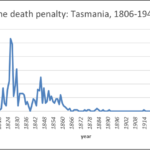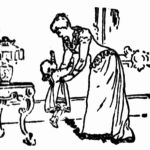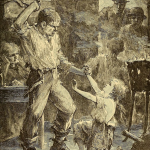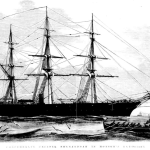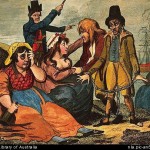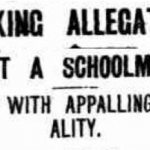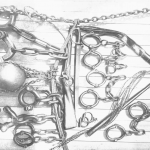Research Brief 31 In October 1841, William Phelps Pickering became the first person sentenced to transportation from New Zealand. His seven year sentence was handed down at the first Quarter Sessions ever held in Auckland after Pickering was found guilty of fraud and misrepresentation. It was one thing for a New Zealand court to hand […]
Category Archives: Research briefs
The hanging years
Research Brief 30 As one of the two original Australian convict colonies, Tasmania shares with New South Wales an ignominious history of capital punishment in the first half century of settlement. The Prosecution Project has recently completed an inventory of executions carried out in Tasmania, beginning in the year 1806 and extending to the last […]
Why history shows we need lawyers
Research brief 29 Why do people need lawyers? This may sound like the start of a joke. Yet the need for lawyers remains a serious issue for anyone seeking protection of their constitutional rights, arbitration in civil disputes or a fair trial in criminal matters. Access to legal services has become a particularly serious question […]
The pretense of a prosecution?
Research Brief 28 In 1900, Mary Ryan was living at North Pine, near Brisbane, with her five children. Her husband had not lived at home with the family for some four or five years. Early on the morning of 4 February 1900, Mary gave birth to her sixth child, a boy. On 17th February 1900, […]
“Mum will be safe now”: Prosecuting children who kill violent men
Lisa Durnian examines patricide prosecutions where children killed their mothers’ abusers. Research Brief 27 – originally published as part of the Australian Women’s History Network’s 16 Days of Activism Against Gender Violence series. Domestic murders are perhaps the most distressing type of homicide, particularly when parents kill their children. But children also kill parents. In Australia about thirteen […]
A foreign fighter
Research Brief 25 Among the lighter sentences awarded to those convicted in the Victorian Supreme Court in the nineteenth century was that of ten days imprisonment handed down to James ‘Charley’ Davidson in March 1865. His offence, however, was more weighty, its context more global than local in significance. The pages of the Supreme Court […]
Interloping at a history conference The Digital Panopticon: Penal history in a digital age
Research Brief 24 As the Prosecution Project’s resident statistician, I recently infiltrated my first history conference – the Digital Panopticon held at the University of Tasmania. I must admit that this conference was one of the most fascinating I have attended. Interesting not only for the variety of projects we heard about, but for […]
Contempt of court or contempt for the court?
Research Brief 23 In 2016 the domestic violence epidemic shows no signs of slowing down. It seems Australian men are going mad. Women – and children – are dying as a result. The ever-increasing tally of deaths and serious injuries is prompting many to demand that the legal system needs to do more to […]
Sexual abuse in schools: An Australian history of criminalisation
Research Brief 22 In 1947 a leading psychiatrist, Dr John McGeorge, told the New South Wales Department of Justice that men who abused children were ‘the most dangerous sex offenders’. These men, he went on to assert, were ‘often in a position of trust, [such as] a schoolteacher or scoutmaster’ (State Records NSW, Report […]
Whipping as a criminal punishment
Research Brief 21 For decades, if not longer, well-meaning parents (and perhaps less well-meaning authority figures in institutional settings) utilised the cane or the belt as an instrument of punishment. These methods are increasingly frowned upon. Corporal punishment has been criminalised in some countries for more than thirty years, and in recent years, Australian courts […]


